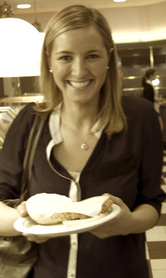A few weeks ago, Jamie Foxx hosted Saturday Night Live and delivered a controversial monologue about how America is changing with regard to race. Dressed in a sleek, all-black suit, shirt, and tie, Foxx began the monologue with a statement that “black is the new white.” Foxx sited the NBA’s Nets moving to Brooklyn (and being partly owned by Jay-Z), Barack Obama’s reelection, and his portrayal of a slave in Django Unchained as proof that “black is in.”
Foxx continued that in Quentin Tarantino’s new flick, “I play a slave. How black is that?” he asked. “I have to wear chains. How whack is that? But not to worry, he said. "I get free. I save my wife and I kill all the white people," Foxx said. "How great is that?”
This performance immediately sparked mania in the Twitterverse, with the majority of headlines dubbing the monologue as unacceptably and offensively racist. The majority of people who were offended by the monologue were white (and conservative) and cited Foxx’s performance as an example of black bigotry and anti-white racism. This argument is grounded in a belief that there exists egregious hypocrisy and a distinct double standard when it comes to black versus white racism. In other words: Why should white people have to continue paying for the sins of our ancestors over a century ago?
The old me would have been pretty offended by Foxx’s monologue. That was before I came to Brown and got involved with a University-sponsored club devoted to embracing what it means to be white and dealing with the inherent ignorance that comes with it. The club is called “Shit White People Say.” (The name is sort of a joke because there have been numerous Twitter accounts, blogs, and YouTube videos showcasing various clichés and verbal mannerisms commonly associated with certain groups. LOL.)
Joining this group has truly been life-changing for me. Honestly: life-changing.
It's no secret that I went to a high school that was 98% white. (My boyfriend, Brad, actually attended my rival high school which was 93% white and -- subsequently --always beat us in sports). Since attending weekly Shit White People Say meetings, under the guidance of the incredible Dr. Fannen, I have come to actually understand this whole “race dilemma” as it exists today in terms of “action and reaction.” In society (as in science), a powerful action causes an equally strong reaction.
The institutionalized and social oppression and discrimination of blacks for the first one hundred years of their freedom from slavery led to the rise of Malcolm X and black nationalism in the 1960's. The message of black nationalism -- that blacks should defend themselves from white hegemony (dismissing nonviolence as the “philosophy of the fool”) -- has seeped into popular culture and remains today, perhaps not blatantly in Jamie Foxx’s monologue as many believe, but certainly in much of the hip-hop/rap culture.
That being understood, I still do not think white people should continue to pay for their sins. However, I also don’t think that Foxx necessarily agrees they should either. I think he was simply using comedy to make light of the evolving history and state of race in America.
Satire can be a form of racial healing. We should not pretend to be a “color blind” culture. Racial disparities are a part of our everyday and the history of black oppression should never be forgotten. After all, it is a formative moment in our nation’s history. The abolition of slavery and efforts to make freed slaves equal under law signified a huge step in negotiating America’s inherent struggle to create a united identity in the face of being a land of diversity.
America is a nation of immigrants (the first arriving only 30 years after the Puritans first arrived on the Mayflower) containing diverse cultures carried out by ethno-racial groups. Over history, as legal barriers crumbled for these marginalized groups, prejudices have proven more difficult to demolish. What ultimately allows us all to live together are values of ‘civic republicanism’ that lie at the heart of the American creed. These values stress responsibility over rights: fixing the community as a central component of identity, and prioritizing a collective good. This is the message in our nations’ Great Seal, formalized in 1782: “E Pluribus Unum,” meaning: “From many, One.”
So while satire can be a healthy way to recognize the state of race today and the history from which it evolved, I do think the monologue is slightly problematic in that it pushes the limit of satire and ultimately causes divide. The opposite of “E Pluribus Unum.” Although I believe Foxx used the phrase “kill[ing] all the white people” who oppressed him to demonstrate his character's ultimate redemption (and not his own personal redemption today in the 21st century), this sort of exaggerated and violent language is exactly what scares people (as indicated by myriad comments in the Twitterverse).
This consequence brings me back to the concept of “action and reaction."
What I am afraid is happening is this: because many whites are feeling persecuted by the legacy of their ancestors, we could see a rise of angry white nationalism as a reaction to the action of perceived “white bigotry."
How do we stop this vicious cycle and just live together in Peace?
We cannot pretend that there are no race issues and put on a front as a “color blind” nation. That is not the reality. The reality is that what makes America a beautiful place is the rich diversity. We are a multi-ethno-racial culture and nation. I personally believe that racial jokes and humor can and should be present but a line needs to be drawn so that we all respect each other as fellow Americans. What divides us is the language of “killing.” As Ghandi says is true: “An eye for an eye only ends up making the world blind.”
Foxx continued that in Quentin Tarantino’s new flick, “I play a slave. How black is that?” he asked. “I have to wear chains. How whack is that? But not to worry, he said. "I get free. I save my wife and I kill all the white people," Foxx said. "How great is that?”
This performance immediately sparked mania in the Twitterverse, with the majority of headlines dubbing the monologue as unacceptably and offensively racist. The majority of people who were offended by the monologue were white (and conservative) and cited Foxx’s performance as an example of black bigotry and anti-white racism. This argument is grounded in a belief that there exists egregious hypocrisy and a distinct double standard when it comes to black versus white racism. In other words: Why should white people have to continue paying for the sins of our ancestors over a century ago?
The old me would have been pretty offended by Foxx’s monologue. That was before I came to Brown and got involved with a University-sponsored club devoted to embracing what it means to be white and dealing with the inherent ignorance that comes with it. The club is called “Shit White People Say.” (The name is sort of a joke because there have been numerous Twitter accounts, blogs, and YouTube videos showcasing various clichés and verbal mannerisms commonly associated with certain groups. LOL.)
Joining this group has truly been life-changing for me. Honestly: life-changing.
It's no secret that I went to a high school that was 98% white. (My boyfriend, Brad, actually attended my rival high school which was 93% white and -- subsequently --always beat us in sports). Since attending weekly Shit White People Say meetings, under the guidance of the incredible Dr. Fannen, I have come to actually understand this whole “race dilemma” as it exists today in terms of “action and reaction.” In society (as in science), a powerful action causes an equally strong reaction.
The institutionalized and social oppression and discrimination of blacks for the first one hundred years of their freedom from slavery led to the rise of Malcolm X and black nationalism in the 1960's. The message of black nationalism -- that blacks should defend themselves from white hegemony (dismissing nonviolence as the “philosophy of the fool”) -- has seeped into popular culture and remains today, perhaps not blatantly in Jamie Foxx’s monologue as many believe, but certainly in much of the hip-hop/rap culture.
That being understood, I still do not think white people should continue to pay for their sins. However, I also don’t think that Foxx necessarily agrees they should either. I think he was simply using comedy to make light of the evolving history and state of race in America.
Satire can be a form of racial healing. We should not pretend to be a “color blind” culture. Racial disparities are a part of our everyday and the history of black oppression should never be forgotten. After all, it is a formative moment in our nation’s history. The abolition of slavery and efforts to make freed slaves equal under law signified a huge step in negotiating America’s inherent struggle to create a united identity in the face of being a land of diversity.
America is a nation of immigrants (the first arriving only 30 years after the Puritans first arrived on the Mayflower) containing diverse cultures carried out by ethno-racial groups. Over history, as legal barriers crumbled for these marginalized groups, prejudices have proven more difficult to demolish. What ultimately allows us all to live together are values of ‘civic republicanism’ that lie at the heart of the American creed. These values stress responsibility over rights: fixing the community as a central component of identity, and prioritizing a collective good. This is the message in our nations’ Great Seal, formalized in 1782: “E Pluribus Unum,” meaning: “From many, One.”
So while satire can be a healthy way to recognize the state of race today and the history from which it evolved, I do think the monologue is slightly problematic in that it pushes the limit of satire and ultimately causes divide. The opposite of “E Pluribus Unum.” Although I believe Foxx used the phrase “kill[ing] all the white people” who oppressed him to demonstrate his character's ultimate redemption (and not his own personal redemption today in the 21st century), this sort of exaggerated and violent language is exactly what scares people (as indicated by myriad comments in the Twitterverse).
This consequence brings me back to the concept of “action and reaction."
What I am afraid is happening is this: because many whites are feeling persecuted by the legacy of their ancestors, we could see a rise of angry white nationalism as a reaction to the action of perceived “white bigotry."
How do we stop this vicious cycle and just live together in Peace?
We cannot pretend that there are no race issues and put on a front as a “color blind” nation. That is not the reality. The reality is that what makes America a beautiful place is the rich diversity. We are a multi-ethno-racial culture and nation. I personally believe that racial jokes and humor can and should be present but a line needs to be drawn so that we all respect each other as fellow Americans. What divides us is the language of “killing.” As Ghandi says is true: “An eye for an eye only ends up making the world blind.”



 RSS Feed
RSS Feed





